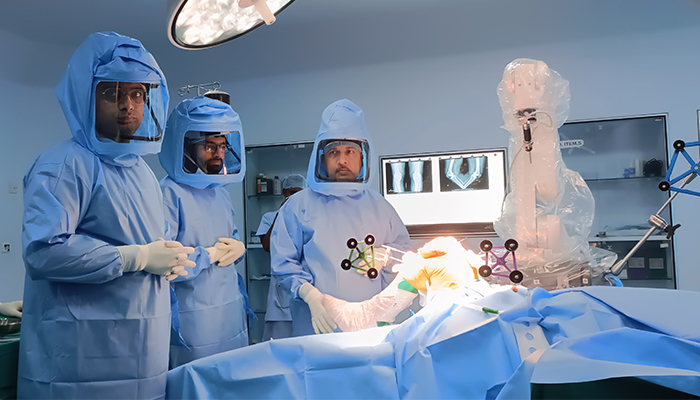Choosing the right surgeon is crucial for a successful outcome in joint replacement surgery. As a medical hub, Delhi boasts some of the best joint replacement surgeons well-versed in advanced surgical techniques and postoperative care. This guide will explore the procedures involved in joint replacement surgery, the recovery process, and how to choose the best joint replacement surgeon in Delhi.
Understanding Joint Replacement Surgery
Joint replacement surgery, also known as Arthroplasty, involves replacing a damaged joint with a prosthesis. This surgery is commonly performed on the hip, knee, and shoulder joints. The primary aim is to relieve pain, restore function, and improve the quality of life for individuals suffering from severe joint problems.
Types of Joint Replacement Surgeries
- Hip Replacement Surgery involves replacing the damaged hip joint with a prosthetic implant. It can be a total hip replacement or a partial hip replacement, depending on the extent of damage.
- Knee Replacement Surgery involves replacing the knee joint with a prosthetic implant. It can be a total knee replacement or a partial knee replacement, based on the severity of the condition.
- Shoulder Replacement Surgery: In this surgery, the damaged parts of the shoulder joint are replaced with artificial components. It can be a total shoulder replacement or a partial shoulder replacement.
Benefits of Joint Replacement Surgery
- Pain Relief: One of the most significant benefits of joint replacement surgery is the relief from chronic pain.
- Improved Mobility: Post-surgery, patients experience better joint function and mobility.
- Enhanced Quality of Life: With reduced pain and improved mobility, patients can return to their daily activities and enjoy a better quality of life.
Choosing the Right Joint Replacement Surgeon in Delhi
Finding an experienced and skilled joint replacement surgeon in Delhi is paramount for successful surgery and Recovery. Here are some factors to consider:
Qualifications and Experience
- Board Certification: Ensure that the surgeon is board-certified in orthopaedic surgery.
- Specialisation: Look for a surgeon who specialises in joint replacement surgeries.
- Experience: Choose a surgeon with extensive experience performing joint replacement surgeries, particularly the type you need.
One of the highly recommended names is Dr. Bhushan Nariani, Vice Chairman – Joint Replacement, from BLK-MAX Super Speciality Hospital, Delhi, who carries over 21 years of experience in performing replacement surgeries ranging from general trauma to complex revision Arthroplasty.
Reputation and Reviews
- Patient Reviews: Read reviews and testimonials from previous patients to gauge the surgeon’s reputation.
- Success Rates: Inquire about the surgeon’s success and complication rates for joint replacement surgeries.
Hospital Affiliation
- Reputed Hospitals: Opt for surgeons affiliated with hospitals in Delhi known for their orthopaedic departments.
Communication and Comfort
- Consultation: Schedule a consultation to discuss your condition and treatment options. Evaluate the surgeon’s communication skills and how comfortable you feel with them.
The Joint Replacement Surgery Procedure
Guided by leading knee replacement surgeons, understanding the joint replacement surgery procedure is essential to ensure a smooth and successful outcome. Here’s an overview of what to expect during the process:
Preoperative Preparations
- Medical Evaluation: A thorough medical evaluation assesses the patient’s overall health and suitability for surgery.
- Preoperative Instructions: Patients are given specific instructions regarding diet, medications, and activities to prepare for surgery.
The Surgical Process
- Anaesthesia: The surgery is performed under general or regional anaesthesia to ensure the patient is comfortable and pain-free.
- Incision and Removal of Damaged Joint: The surgeon makes an incision to access the damaged joint. The damaged bone and cartilage are removed.
- Implant Placement: The prosthetic components are placed and secured in the joint space.
- Closure and Recovery: The incision is closed, and the patient is moved to the recovery room.
Postoperative Care and Recovery
Postoperative care is crucial for a successful recovery and long-term outcome. Here are the critical aspects of the recovery process:
Hospital Stay
- Initial Recovery: Patients typically stay in the hospital for a few days post-surgery. During this time, they are monitored for any complications.
- Pain Management: Pain management is an essential part of the recovery process, with medications provided to manage postoperative pain.
Rehabilitation
- Physical Therapy: Physical therapy begins shortly after surgery to help restore joint function and mobility.
- Exercises: Patients are taught specific exercises to strengthen the muscles around the joint and improve flexibility.
At-Home Care
- Wound Care: Proper wound care is essential to prevent infections. Patients are instructed on how to keep the surgical site clean and dry.
- Activity Restrictions: Patients are advised on activity restrictions and the gradual resumption of daily activities.
Recovery Timeline
Early Recovery (0-6 weeks)
- Mobility Aid: Patients may need mobility aids such as crutches or walkers initially.
- Physical Therapy: Regular physical therapy sessions are crucial during this period.
Intermediate Recovery (6-12 weeks)
- Increased Activity: Gradually increase activity levels and reduce pain and swelling.
- Continued Therapy: Ongoing physical therapy to enhance strength and mobility.
Long-Term Recovery (3-6 months)
- Full Recovery: Most patients achieve full Recovery within 3 to 6 months, significantly improving pain relief and joint function.
While many patients see significant improvement within 3 to 6 months, complete recovery and achieving full functionality may take up to a year or more, depending on the individual’s health, type of surgery, and adherence to rehabilitation protocols.
Conclusion
Choosing the right joint replacement surgeon in Delhi is a critical step towards a successful joint replacement surgery and Recovery. With advanced medical facilities and experienced surgeons in Delhi, patients can expect excellent care and outcomes. Patients can be well-prepared for their joint replacement journey, leading to improved quality of life and enhanced mobility by understanding the procedures and recovery process.
If you’re considering joint replacement surgery, consult with a reputed joint replacement surgeon in Delhi to discuss your options and embark on the path to a pain-free life.
